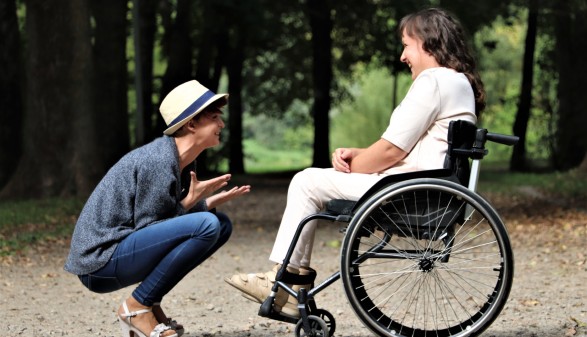What's it really like to be in an interabled relationship?

Fact 1: Interabled relationships do exist.
Fact 2: Interabled relationships/marriages can be as normal as any other relationships/marriages.
Fact 3: Interabled partners can live exciting and fulfilling lives, enjoy intimacy and have children.
What exactly is an interabled relationship?
This article explores the inner workings of an interabled relationship. But first, for those of you who are still in the dark, let’s understand what an interabled relationship means. Interabled relationships are those where one partner has a disability (either a physical one such as being in a wheelchair or being visually impaired, an invisible problem such as Crohn’s disease or a mental health condition like depression) and the other partner does not.
Why would one choose to be in an interabled relationship?
True love has no boundaries or expectations, so being with a partner who has a disability of any kind is, to many, a non-issue. The ‘healthy’ partner simply sees it as another challenge to overcome in the relationship, and let’s be honest, which relationship doesn’t have it’s ups and downs? With a little bit of creativity, thinking-out-of-the-box and working around problems, and a lot of honesty and open communication, an interabled relationship can be as normal and fulfilling as any other relationship.
Besides, sometimes, a disability or condition could be diagnosed or could come about after one is already in a committed relationship. An accident could leave one partner physically disabled, or something like a mental health condition could be diagnosed later on in life, so it’s not always about choosing to be in an interabled relationship but making it work regardless.
Tips to make an interabled relationship work
Honesty is the best policy
Whether you are entering an interabled relationship out of choice or it’s thrust upon you at a later point in life, honesty is the foundation to make it work. Open and honest communication from both the partners - about their fears, concerns, needs, expectations and boundaries - is a must.
Use resources to explain your condition
If you are finding it difficult to explain the nitty-gritties of your condition to your partner, or are uncomfortable doing so, try and find other resources such as internet articles or apps that help them understand it better
Plan date nights
Don’t shun away from things such as date nights and romantic adventures with your partner. Instead of avoiding them altogether out of fear, take charge and choose activities/restaurants/timings that suit you or work around your condition. For instance, give your partner a list of five restaurants that have wheelchair access, and let him choose one from there. Or if you know your energy levels dip past 9 pm, be honest about that and make date nights earlier.
Know your own worth
It’s important for the disabled partner to have a high level of self-esteem. If you think you are a failure or a burden, that will reflect on your relationship. Know your own worth, take time to figure out your needs and boundaries and what you want from a relationship and communicate that to your partner.
Remember this...
And remember, as long as there is understanding, honesty, respect and above all love, an interabled relationship can be as wonderful and long-lasting as any relationship!
